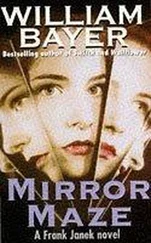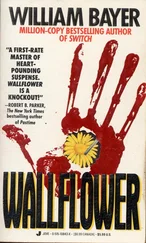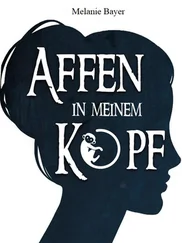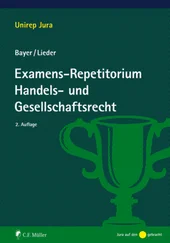William Bayer - Tangier
Здесь есть возможность читать онлайн «William Bayer - Tangier» весь текст электронной книги совершенно бесплатно (целиком полную версию без сокращений). В некоторых случаях можно слушать аудио, скачать через торрент в формате fb2 и присутствует краткое содержание. Жанр: Криминальный детектив, на английском языке. Описание произведения, (предисловие) а так же отзывы посетителей доступны на портале библиотеки ЛибКат.
- Название:Tangier
- Автор:
- Жанр:
- Год:неизвестен
- ISBN:нет данных
- Рейтинг книги:5 / 5. Голосов: 1
-
Избранное:Добавить в избранное
- Отзывы:
-
Ваша оценка:
- 100
- 1
- 2
- 3
- 4
- 5
Tangier: краткое содержание, описание и аннотация
Предлагаем к чтению аннотацию, описание, краткое содержание или предисловие (зависит от того, что написал сам автор книги «Tangier»). Если вы не нашли необходимую информацию о книге — напишите в комментариях, мы постараемся отыскать её.
Tangier — читать онлайн бесплатно полную книгу (весь текст) целиком
Ниже представлен текст книги, разбитый по страницам. Система сохранения места последней прочитанной страницы, позволяет с удобством читать онлайн бесплатно книгу «Tangier», без необходимости каждый раз заново искать на чём Вы остановились. Поставьте закладку, и сможете в любой момент перейти на страницу, на которой закончили чтение.
Интервал:
Закладка:
He began then to read romantic novels, to quench an endless thirst for love. He felt like a shopgirl at first, pathetic, deprived, but when he discovered Stendhal's Lucien Leuwen he quickly lost his shame. He read the book slowly, carefully, rereading certain passages many times. He wanted to make the pleasure last, inhale deeply of each lovesick fume. He re-experienced his growing love for Claude as Lucien's love crystallized for Madame de Chasteller, and although he knew he was being foolish, he persisted, seeking escape from the torment of living beside a woman he adored and yet could not possess.
He needed an escape too from Monsieur de Hoag, who was often hard with him and difficult to please. Whenever Jean offered a suggestion at the office, de Hoag turned on him with a sarcastic smile. "Perhaps, Jean," he'd ask, "you have capital of your own to risk? What? No? Well in that case, my boy, may I suggest you conclude your apprenticeship before proposing absurd ventures doomed to fail."
By November their relationship had begun to change. Jean had the feeling that de Hoag had been insincere with him, that he was being exploited, used as a clerk, that de Hoag had no intention of handing him responsibilities or ever allowing him to make decisions on his own. Perhaps, he thought, it's because I'm young; perhaps he dislikes me because he's jealous of my strength and looks. Joop de Hoag was an ugly man, small, fat, bald, almost repulsive when he smiled. His eyes were small, squirrelish, unyielding, and his mouth was tight with greed.
Why had Claude married him? How could she bear to share his bed? De Hoag had bought her-Jean was sure of that. General Bresson had sold her to him when she was barely out of school. Now the General was rich, and the Dutchman owned a stunning wife.
There was another thing that bothered him: de Hoag's alliance with Omar Salah. Jean knew the chief of customs from the tennis club, where they'd played together several times. The man's conduct was appalling: he cheated on line calls, served before his opponent was prepared, and cursed in Arabic as he rushed the net. De Hoag was involved with him in shady deals, secret, illegal bullion accounts for Salah's rich Moroccan friends. Jean had no proof of this (the details were locked in Monsieur de Hoag's private safe) but he found the idea odious and used it to justify the adulteries in his dreams.
After Christmas the rains began, great torrential showers. Claude left Tangier to spend the winter with friends in Kenya, and a few weeks later Monsieur de Hoag set off for Sao Paulo to inspect his holdings there. Jean, alone with the servants in the old villa, wandered from room to room at night. Water slashed upon the roof, mud slid down the Mountain. Tangier was wet and dark, its cafe s were dreary, full of Moroccans shrouded in hoods that gave off an odor of mildewed wool.
Somehow he got through the winter, consoled by the Hawkins', the Beaumonts, Inigo, Vanessa Bolton, Robin Scott. And then, in spring, Tangier became his mistress-he fell in love with the city once again.
He lavished love upon it as before he'd lavished love on Claude. Its arches, its gardens, its whiteness enchanted him, filled him with tenderness, compelled him to explore. Flowers were bursting out, blossoms on the bougainvillea, lace on the jacaranda trees. He walked the Boulevard, strode through the Socco, discovered the markets, the souks, found places where men beat copper, worked leather, fashioned clay, spun wool. He spent hours in the medina, listening for music that erupted in sudden bursts from shadowed doors. He visited the spice shops, priced ambergris, tasted olives, almonds, dates, then prowled the junk stores looking for Berber jewelry, pausing by fountains to watch women washing clothes. He breathed the rankness of the medina, the dust of the Casbah walls. The beaches, white, untouched, glowed like platinum in the sun. On golden Sundays he sat on Avenue d'Espagne watching the waves thunder against the jetties in the bay. This was a city, he thought, made for lovers, a city built for passion, for long kisses and secret trysts. Its faint putrescence, its architectural decay provided shelter for his lust.
And then Claude came back from Kenya, tanned, aglow. The house was alive again. She worked her garden, cut flowers, placed them everywhere in bowls. She seemed to smile at him more often, and even Monsieur de Hoag was less hard with him than before.
He'd been foolish, he thought, to have dreamed of loving her. Tangier was a city so palpable with romance that it had forced him to invent a lover lest the brilliant setting go to waste.
He decided to concentrate on tennis, in the hope that the discipline of vigorous exercise would clear her from his mind. He began to get up early, run down the Mountain to improve his wind. He played an hour before breakfast with a trainer, and after work returned and played again till dusk. He picked up matches with Spanish businessmen and young, aggressive Moroccans. His game improved. He won a tournament. His body tanned. He became lean and hard.
One afternoon when he returned from the courts Claude stopped him in the hall. She wanted to take up tennis, she said, and asked him if he'd help. He told her that of course he would, and so, with Monsieur de Hoag's approval, they went together to the little tennis shop on Rue Goya and he watched as she was outfitted with a racket, shoes, and clothes.
She was awkward at first, broke her swing at the wrist, but he coached her until she could play a decent game. He ran her about the court, fed her backhands, slices, forehands, serves, and when he noticed an error in her form he crossed to her side of the net, stood behind her, placed his hand beside hers on the racket, and slowly moved her through the strokes.
It was then that his adoration was revived. Her body became demystified. He became accustomed to touching her, seeing her bare arms and legs, looking at her face beaded with perspiration, thinking of her as a woman, warm, alive. His dreams of the autumn, formal ballets played out against sun-dappled seascapes, gave way quite suddenly to moist fantasies of flesh, thrashing limbs, grasping hands, sucking tongues and mouths.
He felt then that they shared a physical attraction, all the more powerful because it was unspoken and taboo. He'd catch her watching him, and sometimes, when he stood behind her pressed against her back, he'd feel her spine tremble where they touched as if her body, heated by exercise, was crying out. He knew then that he only had to wait, that sometime soon, at the proper moment, when they were alone or in public unobserved, he had only to let his hand linger a moment too long and she would not be able to resist.
But when? When might he do it? When might he seize her, kiss her, caress her, cause her to moan and heave? How would they become lovers? When?
It would not be easy, for Tangier was small. The people of the town liked nothing better than to spy upon their neighbors and unravel their affairs. So the tennis court became a stage where they enacted an erotic dance. They used the public game to disguise their private play. Each rally held a hidden meaning, each exchange of shots was a coupling in code. A soft service became a caress. A smash was an aggressive thrust. Sometimes he'd toy with her, feed her soft seductive lobs, and then, when she was near the net, he'd send a passing shot hurtling by her side. They'd smile at each other as if to acknowledge the meaning of the play. They were tennis lovers. Their courtship was the game. With swishing rackets they flirted hour after hour, vigorously twitching each other's lust.
Afterward, on the club terrace, drinking beer in sweat-soaked clothes, Jean would recognize the glint of desire in her eyes, but he said nothing, determined she should make the first advance.
Читать дальшеИнтервал:
Закладка:
Похожие книги на «Tangier»
Представляем Вашему вниманию похожие книги на «Tangier» списком для выбора. Мы отобрали схожую по названию и смыслу литературу в надежде предоставить читателям больше вариантов отыскать новые, интересные, ещё непрочитанные произведения.
Обсуждение, отзывы о книге «Tangier» и просто собственные мнения читателей. Оставьте ваши комментарии, напишите, что Вы думаете о произведении, его смысле или главных героях. Укажите что конкретно понравилось, а что нет, и почему Вы так считаете.












